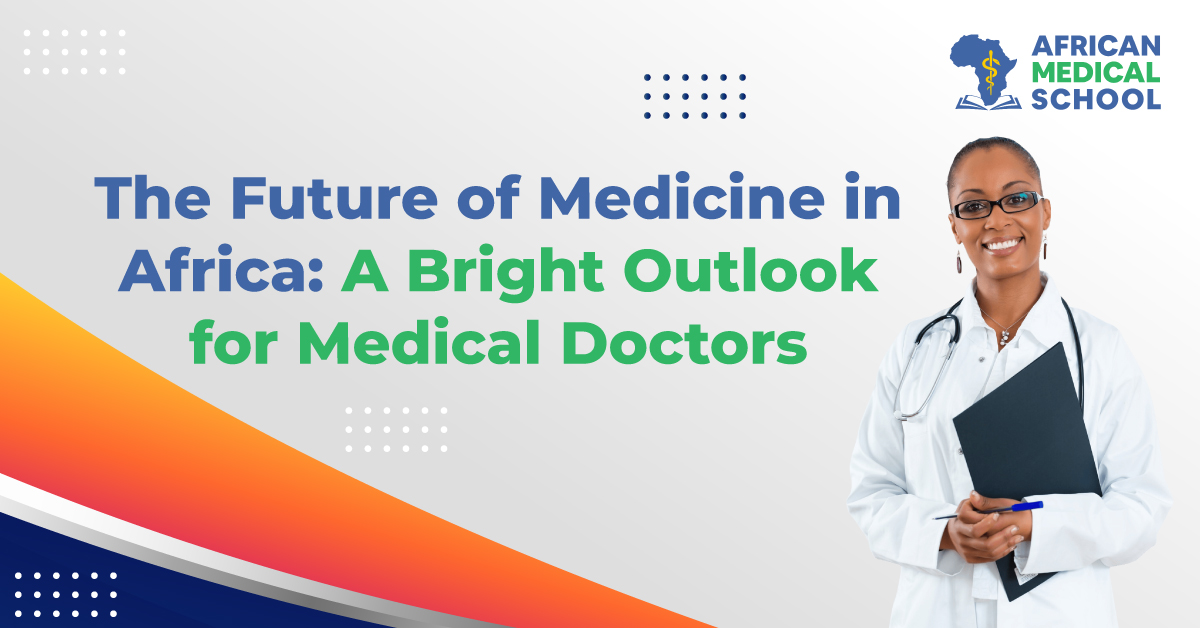|
|
Blog Summary
- The Current State of Healthcare in Africa
- Expanding Access to Quality Medical Education
- Promoting Medical Research and Innovation
- Addressing Healthcare Challenges
- Specialized Medical Training and Fellowships
- Collaboration with International Medical Institutions
- Developing a Diverse Healthcare Workforce
- Leveraging Telemedicine and Digital Health Solutions
- Shaping Healthcare Policies for a Sustainable Future
- Ethical Considerations in African Healthcare
- Conclusion
- FAQs (Frequently Asked Questions)
Africa’s healthcare landscape has transformed remarkably, presenting a bright outlook for medical doctors. With a growing focus on healthcare advancements and increasing investment in medical education, Africa is poised to become a hub of medical excellence. In this article, we will delve into the potential of healthcare in Africa, explore the opportunities to study medicine in Africa and highlight some of the leading medical schools in the region.
The Current State of Healthcare in Africa
Africa’s healthcare landscape has witnessed significant progress in recent years, offering a ray of hope for a brighter future. While challenges remain, the continent actively addresses them, paving the way for improved healthcare outcomes and opportunities for medical professionals.
Recently, African countries have made remarkable strides in enhancing healthcare accessibility and quality. Governments and organizations are investing in healthcare infrastructure, leading to the construction of modern hospitals, clinics, and medical facilities equipped with state-of-the-art technology. These advancements have bolstered diagnostic and treatment capabilities, ensuring patients receive the care they deserve.
Expanding Access to Quality Medical Education
Expanding access to quality medical education is a priority in Africa, paving the way for a new generation of skilled and compassionate medical professionals. Universities and medical schools across the continent are working tirelessly to meet international standards and provide comprehensive education. Scholars and financial aid programs are available to ensure deserving students can pursue their medical dreams. These initiatives aim to create equal opportunities for all students. Through innovative teaching methods and practical training, aspiring doctors have the knowledge and skills to excel in their medical careers. Let the expertise of African Medical School’s education experts guide you in finding the perfect African universities.
Promoting Medical Research and Innovation
Promoting medical research and innovation in Africa unlocks new healthcare advancement possibilities. Collaborations among medical professionals and researchers are driving groundbreaking studies tailored to the specific healthcare needs of the continent. The focus on research and innovation attracts global attention. It fosters partnerships with international institutions, leading to knowledge exchange and the adoption of cutting-edge practices.
Addressing Healthcare Challenges
Addressing healthcare challenges in Africa requires a multifaceted approach and concerted efforts from governments, organizations, and healthcare professionals. Initiatives such as disease prevention campaigns, vaccination programs, and improved maternal and child healthcare services are making a tangible impact on the overall health and well-being of the population.
Specialized Medical Training and Fellowships
These programs provide focused training in various medical specialties, enhancing the quality of care provided to patients. Through specialized training, doctors gain advanced skills and knowledge, enabling them to make a significant impact in their respective fields. Fellowships offer opportunities for further professional development and collaboration with experts, fostering a culture of continuous learning and innovation.

Collaboration with International Medical Institutions
Collaboration with international medical institutions is driving significant advancements in healthcare across Africa. Partnerships with renowned institutions foster knowledge exchange, research collaboration, and the adoption of best practices. Through these collaborations, African healthcare professionals access cutting-edge research, training, and expertise, enhancing the quality of care. International partnerships also attract global investments and support, facilitating the development of state-of-the-art healthcare infrastructure and technology.
By leveraging international collaborations, Africa is accelerating progress in healthcare delivery, research, and innovation, ultimately improving the health outcomes of its population. These partnerships also contribute to the growth and reputation of African medical institutions, making them attractive destinations for medical education and research.
Developing a Diverse Healthcare Workforce
Developing a diverse healthcare workforce is a priority in Africa, recognizing the importance of representation and cultural sensitivity in delivering quality care. There is a growing push to inspire people from various backgrounds to consider pursuing a career in the medical field. This inclusivity fosters a healthcare workforce that reflects the diverse populations it serves. African medical institutions are implementing policies to ensure equal opportunities for underrepresented groups, promoting gender equality and inclusiveness. By embracing diversity, the healthcare sector benefits from a broader range of perspectives, experiences, and skills, leading to improved patient outcomes and culturally competent care.
Leveraging Telemedicine and Digital Health Solutions
Patients in remote and underserved areas can access timely medical advice and care through mobile applications and consultations. Electronic health records in modern digital healthcare solutions have made it possible to share patients’ information among healthcare providers easily. It has resulted in improved coordination and consistency of care. Telemedicine bridges the gap between healthcare providers and patients, particularly in areas with limited access to healthcare facilities. These innovative solutions expand healthcare access, improve health outcomes, and reduce healthcare disparities.
Shaping Healthcare Policies for a Sustainable Future
Governments and stakeholders are working together to formulate policies that prioritize healthcare access, quality, and affordability. These policies aim to address the unique healthcare challenges of the continent while ensuring the long-term sustainability of healthcare systems. Emphasis is placed on promoting preventive care, improving healthcare infrastructure, and strengthening primary healthcare services. Additionally, policies focus on fostering a supportive environment for healthcare professionals, including attractive incentives, training opportunities, and career development pathways.
Ethical Considerations in African Healthcare
Medical institutions in the continent are dedicated to instilling solid ethical values in healthcare professionals. They prioritize patient confidentiality, informed consent, and the highest standards of integrity in medical practice. Efforts are made to ensure equitable access to healthcare services, regardless of socio-economic background or cultural differences. African healthcare professionals are trained to navigate ethical dilemmas, respecting cultural beliefs and practices while upholding the principles of medical ethics.
Conclusion
The future of medicine in Africa holds immense promise. Africa is poised to become a leading destination for medical professionals through investments in medical infrastructure, expansion of quality medical education, and a focus on research and innovation. By addressing healthcare challenges, leveraging technology, and promoting collaboration, the continent is creating a healthcare landscape that offers promising opportunities for doctors enthusiastic about making a difference.


